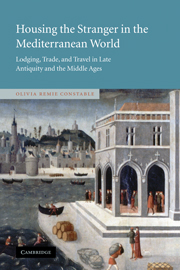 Housing the Stranger in the Mediterranean World
Housing the Stranger in the Mediterranean World Book contents
- Frontmatter
- Contents
- List of illustrations
- List of maps
- Acknowledgments
- Introduction: A culture of travel: words, institutions, and connections
- 1 “Accepting all comers”: a cross-cultural institution in late antiquity
- 2 The transition from Byzantium to the Dār al-Islām
- 3 Commerce, charity, community, and the funduq
- 4 Colonies before colonialism: western Christian trade and the evolution of the fondaco
- 5 Conquest and commercial space: the case of Iberia
- 6 Fondacos in Sicily, south Italy, and the Crusader states
- 7 Changing patterns of Muslim commercial space in the later middle ages
- 8 Christian commerce and the solidification of the fondaco system
- 9 The fondaco in Mediterranean Europe
- Conclusion A changing world: new peoples and institutions in the early modern Mediterranean
- Selected bibliography
- Index
Introduction: A culture of travel: words, institutions, and connections
Published online by Cambridge University Press: 27 August 2009
- Frontmatter
- Contents
- List of illustrations
- List of maps
- Acknowledgments
- Introduction: A culture of travel: words, institutions, and connections
- 1 “Accepting all comers”: a cross-cultural institution in late antiquity
- 2 The transition from Byzantium to the Dār al-Islām
- 3 Commerce, charity, community, and the funduq
- 4 Colonies before colonialism: western Christian trade and the evolution of the fondaco
- 5 Conquest and commercial space: the case of Iberia
- 6 Fondacos in Sicily, south Italy, and the Crusader states
- 7 Changing patterns of Muslim commercial space in the later middle ages
- 8 Christian commerce and the solidification of the fondaco system
- 9 The fondaco in Mediterranean Europe
- Conclusion A changing world: new peoples and institutions in the early modern Mediterranean
- Selected bibliography
- Index
Summary
In the late fifteenth century, a German pilgrim visiting Alexandria became lost in the city's unfamiliar twisting streets. After wandering for a period, he appealed to a local Muslim for guidance, using Latin because he knew no Arabic. “Fontico Cathalano” he said, probably speaking loudly and clearly as travelers often do in a foreign land, asking to be taken to the Catalan fondaco, the hostel in which he was lodging with other European pilgrims. To his great relief, he was immediately conducted to the desired location since the word he used – fontico – was very similar to the Arabic term, funduq, designating the same place. In fact, the two were cognates, and shared a long heritage going back to the classical Greek word pandocheion, an inn or hostelry.
This book traces the history of these closely related words and, more importantly, of the institutions to which they refer, from late antiquity until the eve of the early modern period in the Mediterranean world. It examines their evolution across time, space, and culture, looking at both continuities and changes. What happens to a family of institutions that endures for such a long period, in so many different places? Why does it survive, and what does this survival reveal about the thing itself and the world in which it existed? These questions can only be answered through analyzing these words and institutions within their particular cultural and chronological contexts.
- Type
- Chapter
- Information
- Housing the Stranger in the Mediterranean WorldLodging, Trade, and Travel in Late Antiquity and the Middle Ages, pp. 1 - 10Publisher: Cambridge University PressPrint publication year: 2004
